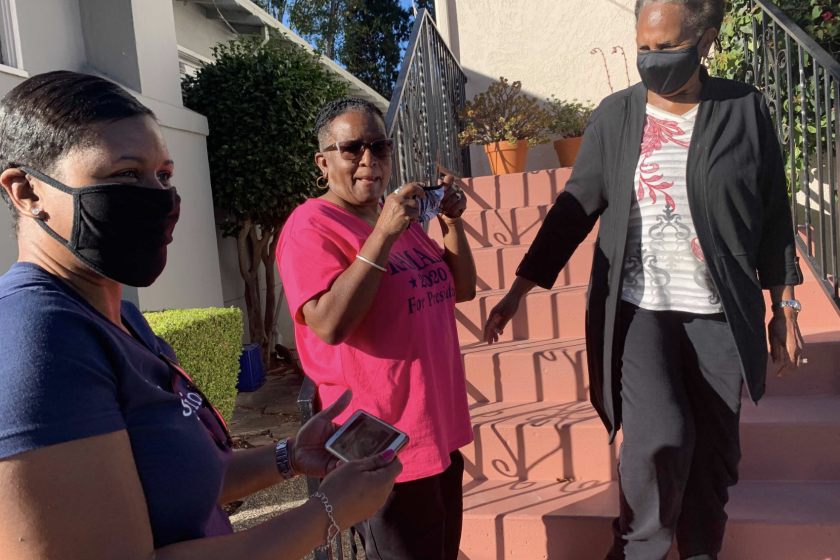Op-Ed: My grandmother was named Kamala. And now, so is my vice president. Why that matters

- Share via
My grandmother’s name was Kamala. She was born in a small slice of western India at a time and a place where the gift of learning was not equally bestowed between genders. If my father’s memory serves correct, she was married in her early teens and hardly had the benefit of a fourth-grade education. Nevertheless, she raised six children who became college graduates, replete with advanced degrees.
My aunt’s name was Kamala. My mom describes her as the sweetest sister-in-law one could ever dream of. I never met her because her life was cut short on a highway in Uganda as was the life of her youngest child. My mom and three of her sisters, not yet teens, were each assigned to care for one of Kamala’s surviving four children, a great charge at such tender ages.
My niece’s name is Kamla. She is a biracial child of immigrants, named in honor of the grandmother she was destined to never know. A businesswoman, an athlete, she grew up in an America where her life was less circumscribed by limitations of the Kamalas who came before her.
My vice president’s name is Kamala. Kamala Devi Harris. She, too, is a biracial child of immigrants. Our mothers wore saris and were raised in a strict patriarchal culture where they forged paths to become women to be reckoned with, raising brown-skinned daughters to be reckoned with.
Kamala means lotus flower. Devi means goddess. Kamala is also another name for Lakshmi, the Hindu goddess of wealth, usually seated serenely on her lotus-flower throne, bright pink lotuses clutched in two of her four hands, a plate of gold coins overflowing in abundance at her feet.
You hear again and again how much representation matters — how you can’t be what you can’t see. So it was inevitable that we would witness scenes of women across the country, women of all skin tones, weeping with joy and hugging their daughters and celebrating in the streets because Kamala Harris was elected to the second-highest public office in the land. She rose to power on the shoulders of the mountains of women piled cairn-like under her, women who tried and failed, women who tried and were swatted down, women who never really got a fair chance to try at all.
On a block along Berkeley’s Bancroft Way, in front of the small, yellow house where the vice president-elect grew up, there was a small but festive gathering.
A few months ago a lovely white child who is growing up in my very lovely white hometown was prattling on and on to me about things in that perfect endearing way that only children of a certain age do, and then abruptly said to me, “Your skin is brown like dirt.”
I immediately attempted to jujitsu this moment into a teachable one because it was expressed malice-free, with all the wide-eyed innocence of a curious child. I explained to her that I like to think of my skin as more of a milk chocolate, and then lightly tap-danced around skin color and differences.
I can’t help but wonder what four years of Kamala Harris in the news — her caramel skin glossy on magazine covers and reflected on front-page news spreads — will do to the psyche of the next wave of lovely white children who grow up in my very lovely white hometown. I have to hope that the jump between my skin reminding a child of dirt and my skin reminding her of just about anything else is somewhat narrowed because of Vice President Kamala Harris, even if by a wisp of an eyelash width.
When I graduated from college, one of our wise faculty members opened the ceremony by noting that during the commencement roll call the harder the names become to pronounce, the greater the sign that we are making progress as a society. It was my father’s favorite moment of my graduation, and let me note that I delivered the valedictory, yet decades later that is the moment he relives with joy.
Covering Kamala Harris
I wish the harder-the-names-are-to-pronounce metric could be the definitive sign of progress. But in reality, it doesn’t work so neatly. And true progress is not won so easily.
My dear friend Rose had her home in Oakland stolen from her during the subprime crisis. She knows she won’t get her house back just because a woman born in Oakland who looks like her named Kamala ascended to the vice presidency of this country. It’s a fact she knows all too well because she lost her home under the presidency of a Black man named Barack.
We can be in awe of the power of a symbol while simultaneously acknowledging its limits. We can hold these two realities, allow ourselves joy while looking forward and saying, onward. Because it is not about where you go or how high you reach, but about whether you uplift others along the way.
Kamala. A lotus flower that ascends above the surface. It remains to be seen whether the ascension of Vice President Kamala Harris will uplift the millions of Roses of this nation, those who lifted her up every step of the way.
Dipti S. Barot is a primary care doctor in the San Francisco Bay Area. @diptisbarot
More to Read
A cure for the common opinion
Get thought-provoking perspectives with our weekly newsletter.
You may occasionally receive promotional content from the Los Angeles Times.












